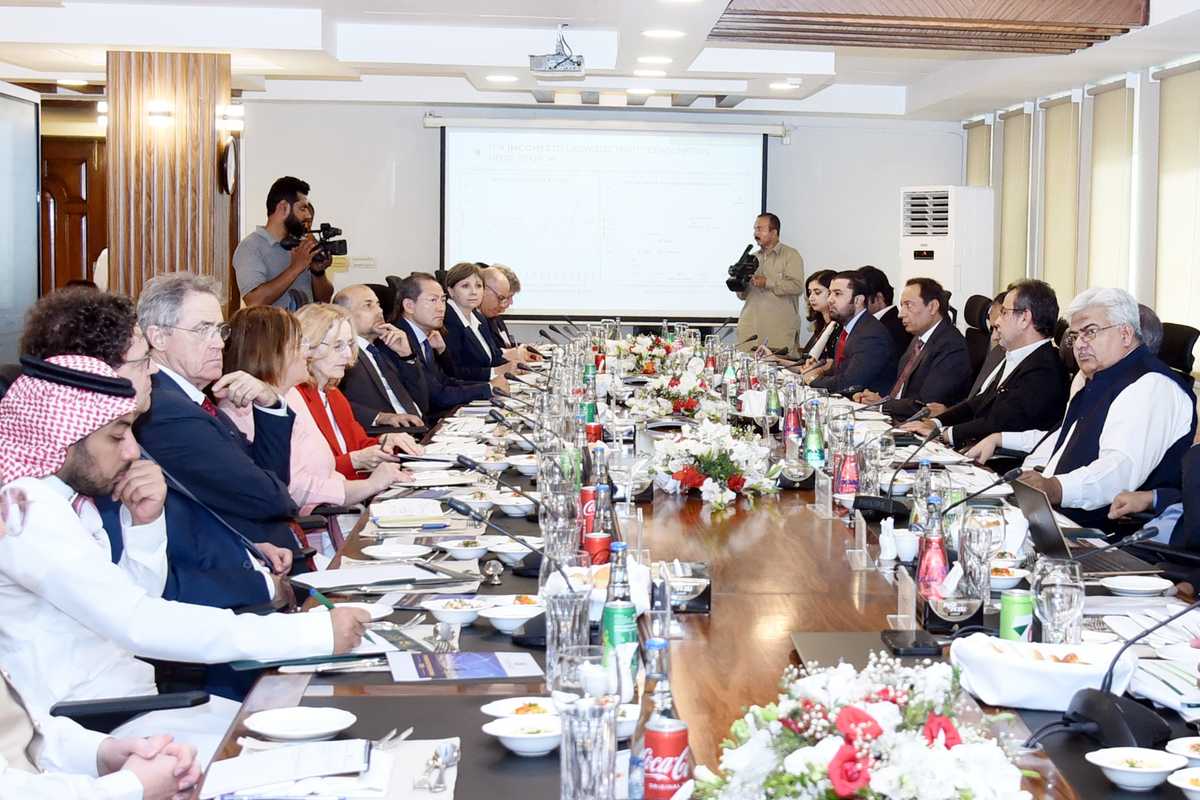Pakistan showcases economic rebound, energy reform plan to global diplomats
Officials highlight growth, tax reform, and $3B energy investment to international envoys in Islamabad briefing
Business Desk
The Business Desk tracks economic trends, market movements, and business developments, offering analysis of both local and global financial news.

The high-level event, held at the Finance Division in Islamabad, was co-led by Federal Minister for Power Sardar Awais Ahmad Khan Leghari and Minister of State for Finance Bilal Azhar Kayani.
Courtesy: Finance Ministry
Pakistani top officials presented a detailed briefing to international diplomats, highlighting signs of economic recovery and an ambitious plan to reform the country’s struggling energy sector.
The high-level event, held at the Finance Division in Islamabad, was co-led by Federal Minister for Power Sardar Awais Ahmad Khan Leghari and Minister of State for Finance Bilal Azhar Kayani. Senior envoys from the United States, United Kingdom, European Union, Japan, Saudi Arabia, and Canada were in attendance.
The ministers provided what they described as a “clear and data-backed roadmap” for stabilizing Pakistan’s economy, improving public finances, and transforming its energy infrastructure.
Economic gains
Minister Bilal Kayani said Pakistan had shifted from a phase of economic stabilization to one of sustained reform. He reported a GDP growth rate of 2.7% in fiscal year 2024–25, along with a 10% increase in per capita income.
Pakistan also achieved a primary surplus of 3.1% of GDP, the highest in two decades, and a current account surplus of $2.1 billion, the first in 14 years. Inflation dropped to 4.5%, its lowest in nine years, and the central bank slashed the policy rate to 11%.
“These milestones were reached without relying heavily on foreign borrowing,” Kayani said, noting that the country’s improved fiscal health had lifted investor confidence and helped upgrade Pakistan’s sovereign credit outlook.
FBR transformation
The ministers also highlighted reforms within the Federal Board of Revenue (FBR). Kayani said tax revenue had grown by 46%, driven by a new strategy focused on people, processes, and technology.
The FBR introduced AI-powered audit tools, digitized invoicing, and improved enforcement measures. As a result, the tax-to-GDP ratio rose to 10.24%, up from 8.8% a year earlier.
“These are not just collection numbers. This is a transformation of how tax is administered in Pakistan,” said the FBR chairman, adding that the government aims to make tax compliance easier and less coercive.
Energy sector reforms
Minister Leghari outlined a roadmap for power sector reforms. He acknowledged that high electricity tariffs and inefficiencies had long burdened consumers and the economy.
He said recent reforms included tariff rationalization, circular debt stabilization, and long-term energy planning based on updated demand trends and distributed generation.
Three electricity distribution companies are being prepared for privatization by early 2026. A new Power Planning & Monitoring Company (PPMC) has also been launched for integrated oversight.
Leghari invited foreign investors to explore $2–3 billion worth of opportunities in renewables, grid upgrades, and energy efficiency.
“We are creating an enabling environment for investment. This is a moment of opportunity,” he said.
Diplomatic response
The ministers said the reforms were part of a broader national strategy aimed at strengthening governance, attracting foreign investment, and restoring global confidence.
Diplomats at the briefing appreciated the transparency of the presentations. One envoy, who was not named, said the session demonstrated Pakistan’s “clear resolve to implement structural reforms and ensure long-term sustainability.”
The government said further sessions with international partners will follow, with a focus on deepening collaboration and investment.







Comments
See what people are discussing